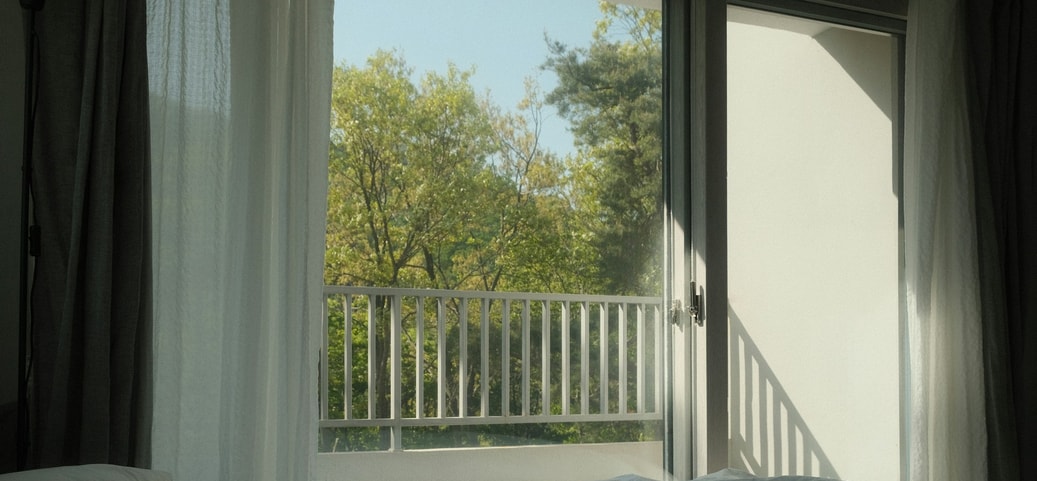Airing out your room before bed: how the indoor climate influences our sleep
Having fresh air in your bedroom is a real game-changer when it comes to getting a restful night’s sleep. Even though we often don’t even notice it, high humidity and too much carbon dioxide can have a negative impact on our well-being and impair our sleep quality. By airing out your room before going to bed, you’re creating the perfect conditions to prepare your body for getting deep, restful sleep. But how often and for how long should you air out your room, and is it healthy to sleep with the window open all night? We have all the answers and a few tips to help you maintain a pleasant indoor climate in your bedroom all year round.
by CALIDA
September 10, 2025•4 min reading time

Airing before sleep: Fresh air in your bedroom creates a better climate and supports restful sleep.
Table of Contents
The key points
Air out the room several times a day to reduce the carbon dioxide concentration and humidity in the bedroom. This will improve your health and sleep quality.
Airing out the room for 10 minutes before and after going to bed is ideal. In summer, it is advisable to do it for longer to prevent overheating and night sweats.
It’s a good idea to keep windows tilted open all the time in summer. In winter, however, this can cause the air inside the room to become too cold and thus promote mould growth.
Airing out the room before and after going to bed: why fresh air is so important
Carbon dioxide (CO₂) accumulates in the room over the course of the day, especially if several people are in there at the same time with the windows closed. You might be familiar with such poor air quality from offices, where the air is often completely stale, especially in summer. This results in us finding it harder to concentrate and suffering from headaches more often.
In the bedroom as well, these kinds of low oxygen concentrations can have a direct impact on the quality of our sleep. This makes it harder for the body to relax, we wake up more frequently and we often feel more tired the next morning than we did the night before.
Airing out your room before bed reduces humidity and ensures that air is circulated: stale air goes out and fresh oxygen comes in. This will help you sleep better and reduce the risk of mould growth. But why not leave the window open all night?
Pros and cons of keeping the windows open all night
As long as noise or allergies don’t interfere with your sleep, there’s no reason not to leave the window open at night on warm summer nights – quite the opposite because while the carbon dioxide content rises sharply again after closing the windows, keeping the windows open allows it to stay at a healthy, low level throughout the night.
In addition, fresh air can help you regulate your body temperature while you sleep and prevent night sweats in summer. This is especially useful if the bedroom has heated up during the day because it was warmer outside than inside.
However, caution should be exercised in winter or when temperatures are cooler, as leaving windows open for longer periods of time can cause the room to become too cold – which in turn often leads to the heating running unnecessarily. Not only does this waste energy, it can also dry out the air. This often results in a stuffy nose, snoring or other respiratory problems.
Lower CO₂ concentration ensures better sleep
Studies show that a low concentration of carbon dioxide in the bedroom is directly related to better sleep quality. Values of less than 800 ppm (parts per million) are ideal – above 1,000 ppm can cause discomfort, headaches or poorer sleep quality.
What’s surprising is that carbon dioxide levels often rise above 2,000 ppm again just a few hours after closing the windows. This is a good reason to air out your bedroom not only before going to bed, but also during the day and for a little while after going to bed, or even throughout the whole night. The reason for this is that fresh air ensures that we sleep more deeply, wake up less often and feel more refreshed in the morning.
Rooms that are too cool can lead to mould growth
If you thought that constantly having cold rooms is not a problem, unfortunately, that’s only half the truth – a cool room temperature of 16°C to 18°C in the bedroom is actually ideal, but it shouldn’t be much colder than that.
The reason? Cool air can’t absorb as much moisture. The warm, humid air produced from sweating or even just breathing is unable to escape; it hits the cold walls and condenses – an ideal breeding ground for mould. That’s why you should air out the room regularly and briefly in autumn and winter rather than the whole time. This allows moisture and carbon dioxide to escape from the bedroom without it becoming too cold.

Airing out your room properly at any time of year: here’s how!
Now that you know why we should air out your room before going to bed and what you should bear in mind, we have summarised the most important information for you below.
How to air out your room in spring and summer:
Air out your room for at least 20 minutes before going to bed, preferably with the window fully open.
In very hot weather, only air out your room once the outside temperature has dropped in the evening; if necessary, leave the window open all night.
Extra tip: To prevent heat build-up and keep your skin dry on warm summer nights, you can also opt for breathable CALIDA sleepwear made from organic cotton or TENCEL™.
And here’s how to air out your room in autumn and winter:
Air out your room for 5 to 10 minutes several times a day to let in fresh air without making it too cold.
Turn off the heater briefly before airing out the room and then switch it on again afterwards to save energy.
Extra tip: Warm pyjamas ensure cosy nights, no matter how cool the ambient temperature is. Breathable materials such as wool and silk prevent unpleasant night sweats.
In conclusion:
Airing out your room before bed is one of the simplest and most effective ways to improve the indoor climate and sleep quality. Just 10 minutes of fresh air in the evening can help to reduce humidity and carbon dioxide levels in your room, regulate the temperature and prevent night sweats.
Always adjust your airing-out routine to the time of year and keep your bedroom pleasantly cool even in summer – a temperature between 16°C and 18°C is ideal. Combine this with skin-friendly, temperature-regulating sleepwear to create the ideal conditions for restful nights and a fresh start to the day.
Discover more interesting blog posts:


